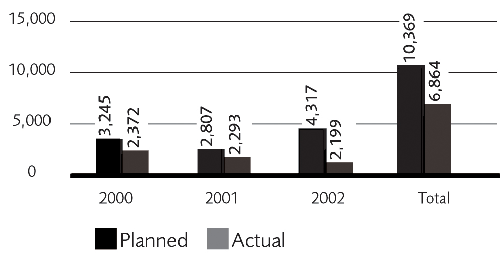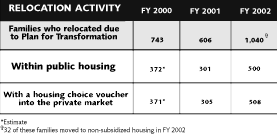In our first summary report of 2003, MPC takes a close look at progress made in key areas of the CHA Plan for Transformation, specifically in the redevelopment and rehabilitation of apartments and in the relocation process and its impact on families.
Now in the fourth year of its 10-year timeline, the Chicago Housing Authority (CHA) Plan for Transformation is making progress toward its aggressive redevelopment, relocation and service delivery goals. A new CHA paradigm is indeed emerging, one more integrated with and beneficial to Chicago neighborhoods. The goal is to ensure that families who endured the degrading conditions of years past are among the many beneficiaries of this new brand of public housing.
LOOKING AT BRICKS AND MORTAR
CHA built and renovated approximately 4,605 apartments in 2002, 1,588 less than its development and rehabilitation goals for the year. Although housing development activity fell short of 2002 goals — especially in terms of family housing — 1,045 apartments completed immediately prior to 2000 are being counted as part of the overall CHA commitment to provide 25,000 public housing apartments. This addition puts CHA 290 apartments ahead of its development goal through 2002. There are also 11 mixed-income development contracts negotiated for construction starts in 2003. To stay on schedule, it is critical that this work proceed.
CHA REDEVELOPMENT ACTIVITY
Since the Plan began, nearly 7,000 uninhabitable apartments in high-rises have been (or are in theprocess of being) torn down, 1,173 units have been constructed and 6,285 have been renovated — adding up to 7,457 apartments available for occupancy. The bulk of this included senior housing. As construction transitions to family buildings, a critical question is whether the new apartments will be large enough to accommodate the families who lived in old CHA units.
DEMOLITION ACTIVITY

Of the 14,000 apartments deemed uninhabitable andscheduled for demolition, 5,800 have been knocked downsince the Plan began. CHA reports that approximately 70percent of these apartments were already vacant, although the numbers do not track "non-leaseholders" who occupied some of these substandard units. These demolition totalsdo not include units currently being demolished.
THE IMPACT ON CHA FAMILIES
Nearly 2,400 families have moved out since the Plan began, 345 of them into permanent housing because of the Plan for Transformation. This does not include 2,797 senior citizens who moved within renovated buildings. Relocation activity has been substantially less than projected in the original Plan for Transformation, when CHA anticipated that up to 1,200 families would move out with a housing choice voucher each year. Much of this can be attributed to adjustments made to the program along the way to accommodate schedule changes and recommendations from residents and advocates.

2002 LEASE COMPLIANCE UPDATE
To return to renovated or redeveloped apartments, tenants must — according to the Relocation Rights contractsigned by tenant leaders and CHA — be "lease compliant." In 2002, 1,724 residents went through Initial Right of bReturn Recertification, also known as lease-compliance review. Residents who were lease compliant as of October 1999 and who remain lease compliant will be entitled to a redeveloped or rehabilitated CHA apartment. This right ofreturn is guaranteed by the Relocation Rights Contract, which specifies residents' rights and duties as well as CHA's obligations to residents. Critical to the success of the Plan in 2003 will be efforts to help non-lease compliant residents with curable violations. CHA will be stepping up efforts to link residents with relocation staff and Service Connector providers.

For a more comprehensive analysis of CHA's historic Plan for Transformation, visit MPC's Web site at www.metroplanning.org. MPC Fact Sheets and other research papers that examine various components of the Plan, specifically redevelopment, relocation, service delivery, and housing choices for families who have already moved into the private market using a housing choice voucher, are available. MPC's fifth Fact Sheet in the Public Housing in the Public Intere st series, to be released in summer 2003, will give a status report on the Plan and revisit questions raised in each of the previous fact sheets.
MPC is deeply grateful to the John D. and Catherine T. MacArthur Foundation, Lloyd A. Fry Foundation, Sara Lee Foundation, Bowman C. Lingle Trust and Bank One Corporation for their funding of public housing work this report will complement.
For more information about MPC's Public Housing in the Public Interest program, contact Robin Snyderman, MPC housing director at 312.863.6007 or rsnyderman@metroplanning.org.